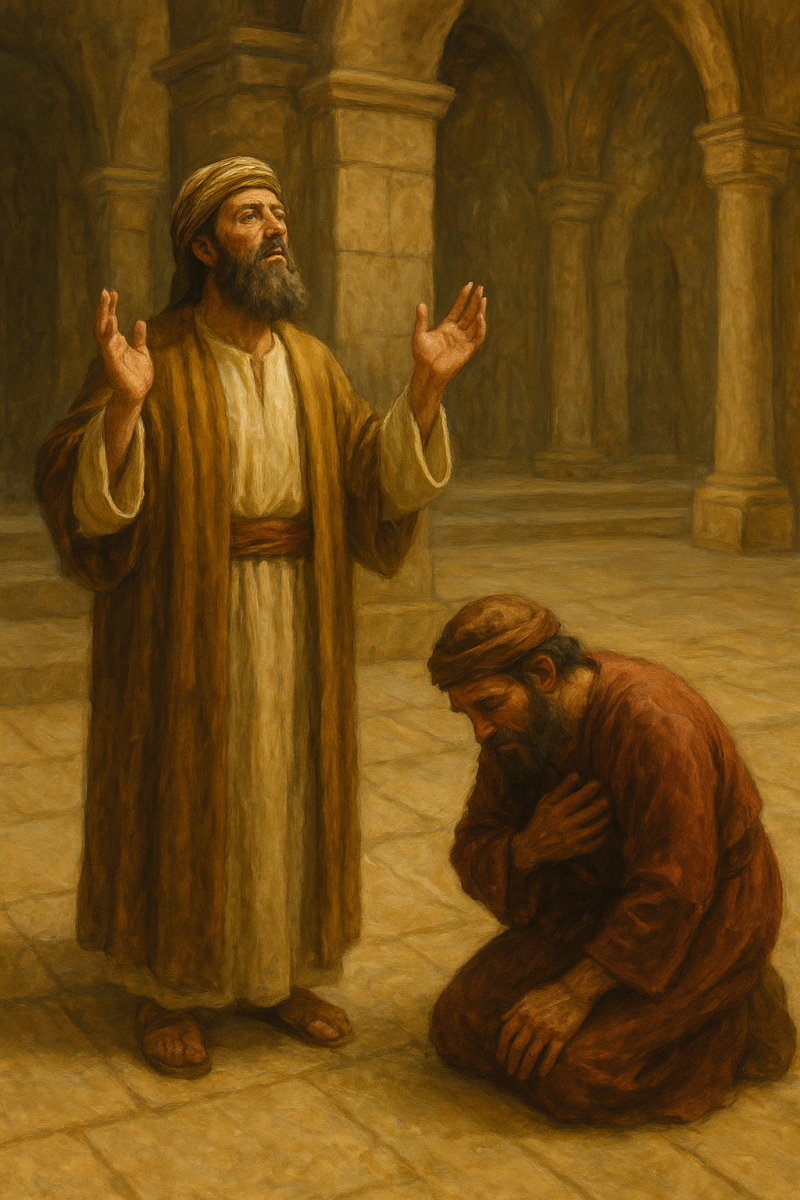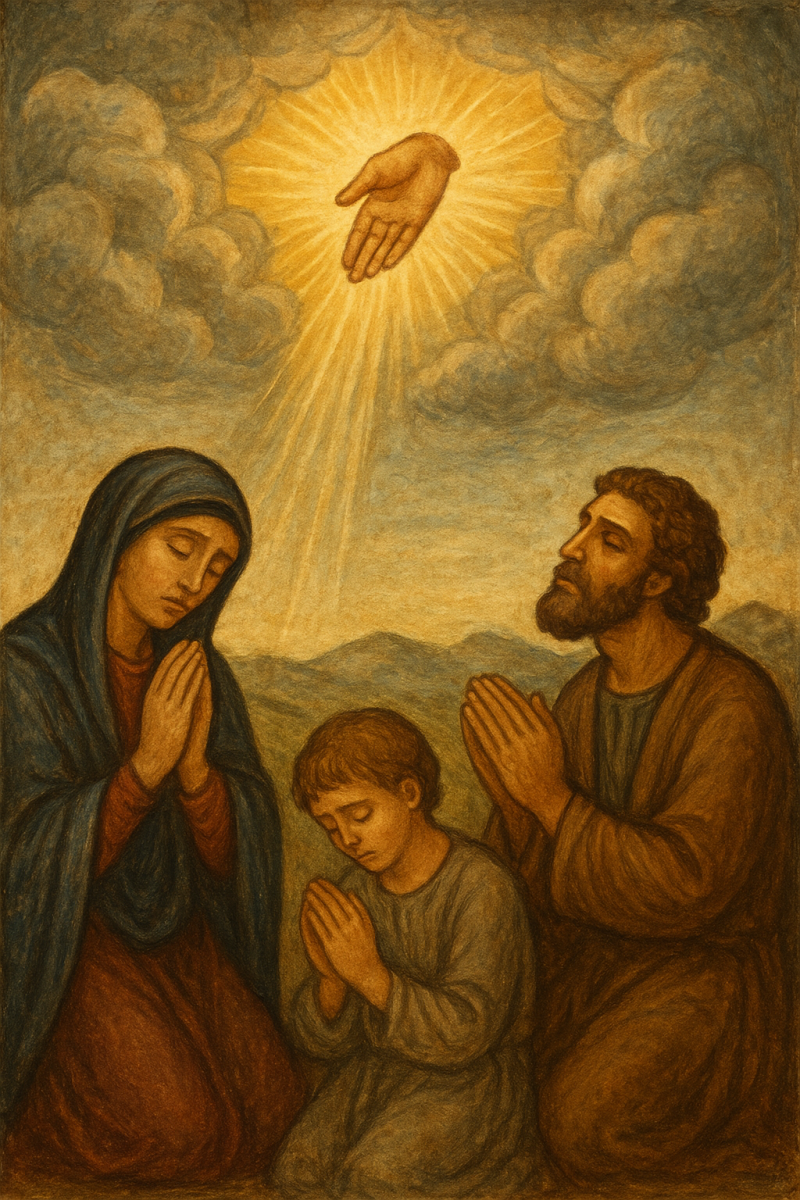

Jesus spoke the following parable to some people who prided themselves on being virtuous and despised everyone else: ‘Two men went up to the Temple to pray, one a Pharisee, the other a tax collector. The Pharisee stood there and said this prayer to himself, “I thank you, God, that I am not grasping, unjust, adulterous like the rest of mankind, and particularly that I am not like this tax collector here. I fast twice a week; I pay tithes on all I get.” The tax collector stood some distance away, not daring even to raise his eyes to heaven; but he beat his breast and said, “God, be merciful to me, a sinner.” This man, I tell you, went home again at rights with God; the other did not. For everyone who exalts himself will be humbled, but the man who humbles himself will be exalted.’
The Lord is a judge, who is not respect the personages. This sentence from the Book of Ecclesiasticus serves as a fitting introduction to today’s Gospel reflection.
Jesus presents another parable for us to consider, one inspired by his observations of daily life. He noticed how some people glorified themselves before others and even dared to present their own lives as praiseworthy before God.
The Parable of the Pharisee and the tax collector is a classic example of how a certain attitude can create an alternative reality, distancing us from the truth. Sooner or later, this leads to a harsh confrontation with real life. Often, we prefer to escape into illusions rather than face the difficulties of human existence.
When we read this Gospel and its parable, we may be tempted to categorize people based on their social status or style of prayer—the proud and the humble. Indeed, Jesus encourages us to interpret the parable in this way. However, the Lord invites us to look deeper. Both the Pharisee and the tax collector were equal in their human frailty; neither was better nor worse in God’s eyes. Despite their different roles in society, both stood at the same level before God—as poor and weak individuals.
This brings us back to the first sentence from Ecclesiasticus: The Lord is a judge, who is not respect the personages. Everyone is equal before Him, with their own strengths and weaknesses. God is like the sun, shining on each person, revealing both the light and the darkness in their lives.
When we come before God, we all stand on equal ground, no matter what we do in our daily lives—whether we are extraordinary or ordinary. With our unique talents and virtues, as well as our shortcomings, what truly matters is whether we stand before God, asking for forgiveness as the tax collector did. In doing so, we foster humility and a spirit of gratitude.
Through this parable, God invites us to encounter Him in the sacrament of mercy, so that we may choose the path of the one who seeks forgiveness. Amen.

Jezus opowiedział niektórym, co dufni byli w siebie, że są sprawiedliwi, a innymi gardzili, tę przypowieść: "Dwóch ludzi przyszło do świątyni, żeby się modlić, jeden faryzeusz, a drugi celnik. Faryzeusz stanął i tak w duszy się modlił: „Boże, dziękuję Ci, że nie jestem jak inni ludzie: zdziercy, niesprawiedliwi, cudzołożnicy, albo jak i ten celnik. Zachowuję post dwa razy w tygodniu, daję dziesięcinę ze wszystkiego, co nabywam”. A celnik stał z daleka i nie śmiał nawet oczu wznieść ku niebu, lecz bił się w piersi, mówiąc: „Boże, miej litość dla mnie, grzesznika!” Powiadam wam: Ten odszedł do domu usprawiedliwiony, nie tamten. Każdy bowiem, kto się wywyższa, będzie poniżony, a kto się uniża, będzie wywyższony".
Pan jest Sędzią, który nie ma względu na osoby. To zdanie z Księgi Syracha stanowi trafne wprowadzenie do dzisiejszej refleksji nad Ewangelią.
Jezus przedstawia nam kolejną przypowieść, inspirowaną swoimi obserwacjami codziennego życia. Zauważył, że niektórzy ludzie wynosili się nad innych, a nawet odważali się przedstawiać własne życie jako godne pochwały wobec Boga.
Przypowieść o faryzeuszu i celniku jest klasycznym przykładem tego, jak pewna postawa może stworzyć alternatywną rzeczywistość, oddalając nas od prawdy. Prędzej czy później prowadzi to do bolesnego zderzenia z rzeczywistością. Często wolimy uciekać w iluzje niż zmierzyć się z trudnościami ludzkiego życia.
Czytając tą Ewangelię i przypowieść, możemy być skłonni, by dzielić ludzi według ich statusu społecznego lub sposobu modlitwy — na pysznych i pokornych. Rzeczywiście, Jezus zachęca nas, by w ten sposób interpretować przypowieść. Jednak Pan zaprasza nas, by spojrzeć głębiej. Zarówno faryzeusz, jak i celnik byli równi w swojej ludzkiej słabości; żaden z nich nie był lepszy ani gorszy w oczach Boga. Pomimo różnych ról społecznych, obaj stali na tym samym poziomie przed Bogiem — jako ludzie ubodzy i słabi.
To prowadzi nas z powrotem do pierwszego zdania z Księgi Syracha: Pan jest Sędzią, który nie ma względu na osoby. Każdy jest przed Nim równy, ze swoimi mocnymi i słabymi stronami. Bóg jest jak słońce, które oświetla każdego człowieka, ukazując zarówno światło, jak i ciemność w jego życiu.
Stając przed Bogiem, wszyscy jesteśmy sobie równi, niezależnie od tego, co robimy na co dzień — czy jesteśmy wybrani do jakieś funkcji, czy zwyczajni. Z naszymi wyjątkowymi talentami i cnotami, ale też z naszymi słabościami, najważniejsze jest to, czy potrafimy stanąć przed Bogiem i prosić o przebaczenie, jak uczynił to celnik. W ten sposób kształtujemy w sobie pokorę i ducha wdzięczności.
Przez tą przypowieść Bóg zaprasza nas do spotkania z Nim w sakramencie miłosierdzia, abyśmy wybrali drogę tego, który szuka przebaczenia. Amen.
Add comment
Comments